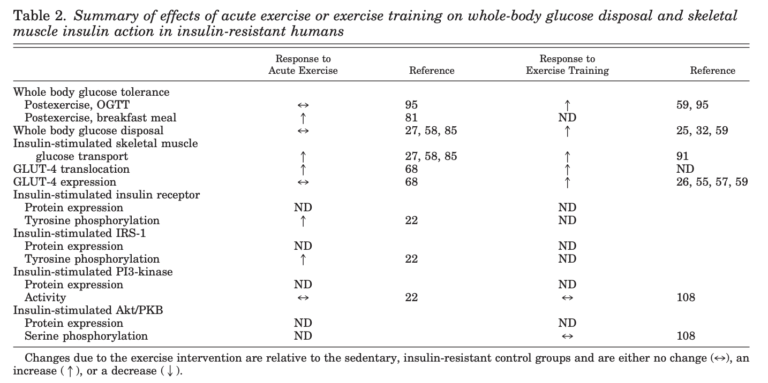Type 2 diabetics and other insulin-resistant individuals commonly exhibit skeletal muscle insulin resistance—that is, their muscles fail to remove glucose from the blood in response to insulin stimulation as effectively as their healthy peers. Insulin acts on skeletal muscle cells through a variety of pathways that bring glucose transporters (specifically, GLUT-4 transporters), which pull glucose from the blood into the muscle, to the surface of cells. As muscles become less responsive to insulin, this glucose disposal mechanism becomes reduced, and with it, the ability of muscle to effectively regulate blood glucose levels decreases.
This highly cited 2002 paper reviews evidence and mechanisms linking both acute and chronic exercise to improvements in skeletal muscle insulin resistance in both rats and humans. It is well-established that exercise acutely increases muscular insulin response; in rodents and humans, muscles show increased GLUT-4 levels on the cellular surface and increased glucose transport by the muscles in response to insulin during and immediately after exercise. Multiple references also have shown that chronic exercise increases resting muscle cell GLUT-4 levels, muscular insulin sensitivity, and both muscular and whole-body glucose transport in both rodents and humans. Mechanistic evidence suggests these improvements in muscular glucose disposal are related to increased responsiveness of exercised skeletal muscle to insulin—i.e., the same insulin dose triggers greater GLUT-4 mobilization and thus greater glucose transport in exercised muscles than in non-exercised muscles. This evidence is consistent with the broader observation that exercise training has beneficial effects in insulin-resistant individuals and may support prevention and/or reversal of skeletal muscle insulin resistance (and whole-body insulin resistance) in humans.

Overall, this paper presents a variety of evidence supporting the argument that both acute and chronic exercise can ameliorate one of the primary defects seen in insulin-resistant and diabetic individuals. This topic will be explored in greater detail in future articles on CrossFit.com.